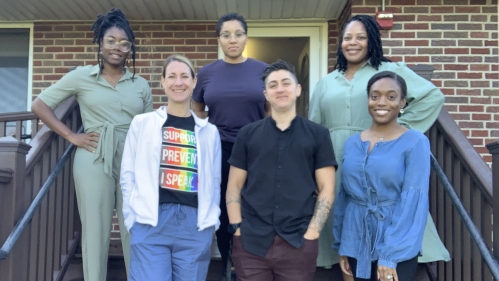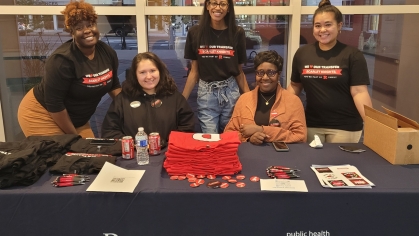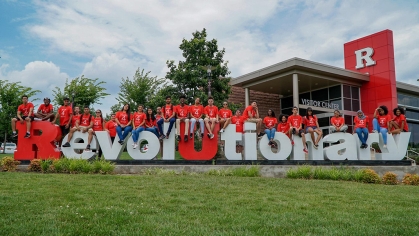CAPS Next Step Program Fills Gap for Students at Rutgers University

Rutgers students sometimes experience mental health issues that require a higher level of care than regular therapy appointments. While these students would be forced to choose between hospitalization or intensive outpatient care to meet their needs at most universities, Student Health's CAPS Next Step program steps in to provide a higher level of care that allows them to keep taking classes.
“We started the CAPS Next Step Program almost four years ago, in January 2019,” said Dr. Jennifer Jones-Damis, who is the director of Counseling, ADAP, and Psychological Services (CAPS) at Rutgers University. CAPS is located in Student Health, which is itself located within the Division of Student Affairs.
“A lot of our students were going to what we call a ‘higher level of care,’ whether that was hospitals, partial hospitalization, or intensive outpatient programs. When they came out, they still wanted to be students,” Jones-Damis said. “But if they did a traditional, intensive outpatient program, most of them had to withdraw from the semester.”
Enter CAPS Next Step, a treatment program tailored to students who need enhanced care. Every week in this program, students attend a total of four groups, one case management session, and one individual therapy session, all while remaining enrolled at Rutgers.
The program is free to all students, with or without medical insurance, and they can enter and leave on a rolling basis. On average, students stay in the program for about three months, and the program can accommodate up to thirty students in the program at one time.
Staff working to serve within Next Step affirmed the importance of their work in helping students reach a better mental place.
“We’re working with more high-risk students, which can feel intense at times,” said Joyce Darakcioglu, who works as a clinical social worker at Next Step. “But the program is designed to lower that intensity, so we get the privilege of seeing them learn to regulate their emotions, function more effectively, and start to engage in life better because of the intensive treatment that we’re able to provide.”
Jhonel Richards, who works as a clinician at Next Step, agreed.
“A huge part of my role in counseling is not only to provide validation in a world filled with invalidation, but also to fill the gaps in what students might not know,” she said. “We’re asking students to take what they’re learning and practice it between sessions, so they improve with skills like executive functioning, building a balanced schedule, coping with distress, communicating effectively, and so on.”
Additionally, beyond the importance of their work, the staff of Next Step take care to create an engaging and welcoming environment for all students who engage with their program.
“People with marginalized identities experience exacerbated harm and discrimination that leads to negative health outcomes because of the way that our systems are built,” said Zan Haggerty, who serves as the assistant director of Next Step. “The population who come into the building are predominantly queer and trans students of color who are at the center of multiple marginalized identities.”
Richards, who is bi- and pan-sexual, as well as Black, emphasized the significance of staff diversity in Next Step.
“Personally, I would have benefited from receiving counseling as an undergraduate, but counseling wasn’t normalized for me, so I didn’t take that next step to reach out for support,” she said. “What would have helped is to see someone that looked like me in this field, and my hope now is to encourage other students who may share similar identities as myself.”
Since it started, the program has received almost 500 referrals, been profiled in Inside Higher Education, and praised by an op-ed in the Daily Princetonian. Only two other universities in the U.S. have similar programs—Colorado State University and Michigan State University—and both require insurance and operate as an intensive-outpatient program, not a program that students participate in while continuing their classes.
Finally, participating students also appreciate the work of Next Step. “Next Step was a vital resource for my wellness this summer and fall,” one anonymous student wrote. “I greatly needed to be in a structured and recurring therapy space, and this program helped me so much!”
Dr. Francesca Maresca, assistant Vice Chancellor of Health and Wellness, also affirmed the importance of the program.
“’The mission of Student Health is to offer healthcare for the whole student body, mind, and spirit,’” Maresca said, quoting from the mission statement available on the Student Health website. “That’s what Next Step does. It helps our students achieve well-being at the same time as it lets them achieve academic success.
“These students require and deserve more, and the fact that we’re able to provide what they need right here on-campus is so important.”
That same sentiment is shared among the entire Next Step staff.
“I’ve heard, ‘I didn’t think that I would make it to this age’ from so many students,” said Haggerty. “I’ll never forget that line. Next Step really is a life-saving program.”
For more information or to find out how to refer a student to CAPS Next Step, click here or call CAPS at 848-932-7884.



